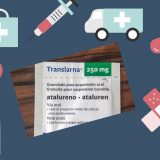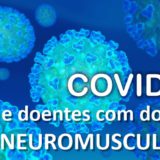Efeito do treinamento muscular sobre a função pulmonar de pacientes com doença neuromuscular lentamente progressiva
Turquia – 26 pacientes com doença neuromuscular lentamente progressiva foram divididos em dois grupos, um dos quais foi sibmetido a treimamento dos músculos inspiratórios e expiratórios duas vezes ao dia, cinco vezes por semana, por 8 semanas. A análise dos parâmetros da função pulmonar demostrou um significativo aumento da capacidade respiratória nos pacientes que fizeram treinamento muscular.
O resumo em inglês pode ser lido abaixo:
(Clinical Rehabilitation, 2013) Effects of respiratory muscle training on pulmonary functions in patients with slowly progressive neuromuscular disease: a randomized controlled trial
Goksen Kuran Aslan, H Nilgun Gurses, Halim Issever and Esen Kiyan – Turkey
Abstract
Objective: To investigate the effects of inspiratory and expiratory muscle training on pulmonary functions in patients with slowly progressive neuromuscular disease.
Design: Prospective randomized controlled double-blinded study.
Setting: Chest diseases clinic of university hospital.
Subjects: Twenty-six patients with slowly progressive neuromuscular disease followed for respiratory problems were included in the study. Patients were randomly divided into two groups; experimental (n = 14; age 31.6 ±12.3 years) and sham (n = 12; age 26.5 ±8.6 years) groups.
Methods: Spirometry, peak cough flow, maximal inspiratory pressure, maximal expiratory pressure, and sniff nasal inspiratory pressure were measured before the eighth week of study, and subsequently at end of it. Respiratory muscle training was performed by inspiratory (Threshold Inspiratory Muscle Trainer) and expiratory (Threshold Positive Expiratory Pressure) threshold loading methods. Training intensities were increased according to maximal inspiratory and expiratory pressures in the experimental group, while the lowest loads were used for training in the sham group. Patients performed 15 minutes inspiratory muscle training and 15 minutes expiratory muscle training, twice a day, five days/week, for a total of eight weeks at home. Training intensity was adjusted in the training group once a week.
Results: Maximal inspiratory and expiratory pressures (cmH2O, % predicted) (respectively p = 0.002, p = 0.003, p = 0.04, p = 0.03) and sniff nasal inspiratory pressure (p = 0.04) were improved in the experimental group when compared with the sham group. However, there was no improvement in spirometric measurements when groups were compared (p > 0.05).
Conclusions: As a conclusion of our study, we found that respiratory muscle strength improved by inspiratory and expiratory muscle training in patients with slowly progressive neuromuscular disease.



